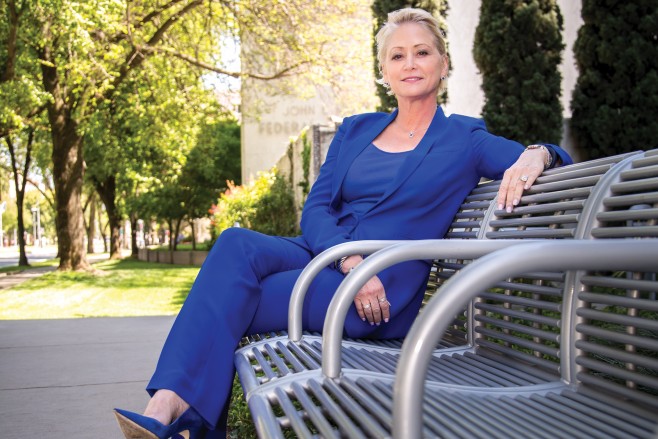
Marcia L. Augsburger ’81 has earned her place as a respected healthcare litigator. (Photo by Jason Sinn Photography)
In her office on the 24th floor of the Wells Fargo building in Sacramento, California, attorney Marcia L. Augsburger ’81 has earned her place as a respected healthcare litigator.
Yet the daughter of evangelist, author and former EMU President Myron Augsburger ’55 and Esther Kniss Augsburger ’71, renowned for her Christian-themed art, can’t shake the thought that others feel she should have pursued a more ministry-oriented career.
“When I was younger, I felt people wanted us to display our spirituality in certain ways. My parents also emphasized the importance of service and being active in the church, so I struggle with the guilt of taking a different path,” she says. “But I do feel that what I am doing is important to preserving people’s health and wellbeing.”
As an attorney-partner for the global law firm DLA Piper, Augsburger specializes in litigation in the healthcare industry, privacy law and telehealth, as well as healthcare dispute resolution. Most often she represents hospital systems in conflict with insurance companies and health plans. A typical case might focus on a contract dispute that involves more than $5 million and a massive amount of data and documents.
For example, in a recent case against a prominent health insurance company, Augsburger represented 13 hospitals in a dispute over nonpayment for emergency services. The case involved over 10 million documents, more than $100 million in disputed payments, and numerous cross-claims by the insurance company, which alleged unfair business practices. The cross-claims led to an Office of the Inspector General investigation, which Augsburger also defended.
“It’s so expensive to defend the claims levied by the government that hospitals often just settle to avoid litigation and risk. I was fortunate to have a client that said, ‘No, we won’t pay to make this go away when we know we didn’t do anything wrong. We stand behind what we did and what we believed was best for patient care.’ I love representing people with such strength of character and courage.”
In 1997, she enjoyed collaborating with her husband, Steve Goff – her law partner then and now – on cases that not only resulted in favorable outcomes for her clients but also exposed the exhorbitant profits some health plans were “making on the backs of hospitals and individuals.”
This and other successful cases over her 24-year career bolster her confidence that she has, indeed, found her place of service. Getting to that place, however, took some time and soul-searching.
The first hint of her calling came in sixth grade, when a teacher encouraged her love of oral argument and her passion for writing courtroom dramas. But when she entered college, she opted to pursue a degree in education because it was “extraordinarily rare for a Mennonite, particularly a Mennonite woman,” to pursue a legal career.
Augsburger graduated from EMU with a bachelor’s in education and began teaching at a Pennsylvania elementary school. Although the experience was positive, the job didn’t feel like the right fit. So she moved to Washington D.C. and, after working awhile on Capital Hill, took a position with the master’s program at Georgetown University’s School of Foreign Service.
At Georgetown, she worked with a woman who was pursuing a law degree. Their discussions rekindled Augsburger’s original passion and prompted her to apply to law school at the University of California, Davis. She obtained her JD in 1989 and soon after accepted a position with McDonough Holland & Allen PC, a Sacramento firm with a solid reputation and a strong relationship with Sutter Health. Augsburger’s involvement with healthcare law grew from there and she forged a path that pointed back toward her beginning.
“My parents’ emphasis on ethics and honesty made my going into law a natural fit, and my father’s emphasis on women’s equality gave me the strong core it takes to be a woman in the legal field,” she says. “Healthcare also made sense because of my background – my uncle Mark Kniss ’51 was a very caring doctor and I grew up hearing stories about my missionary grandmother delivering babies and taking care of villagers who otherwise had no medical care.”
At the intersection of health and law, Augsburger has found her place and is committed to serving others in it.